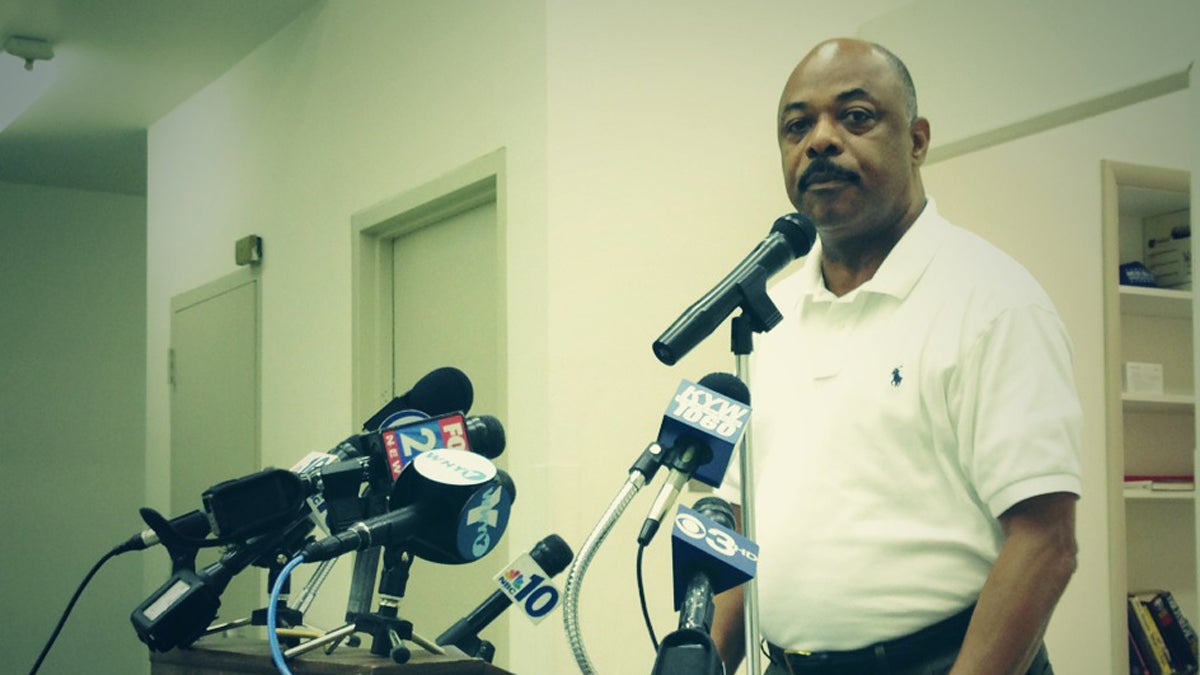Philly school district says teachers’ union giveback offer not enough

Philadelphia Federation of Teachers president Jerry Jordan announced that he will recommend to members a one-year pay freeze and health care changes to help fill the district's budget shortfall. (Holly Otterbein/WHYY)
[Updated, 7:41 p.m.] The Philadelphia teachers union and the School Reform Commission have been at the table for weeks now hashing out a new contract agreement.
Neither side has budged publicly, until now.
Jerry Jordan, president of the Philadelphia Federation of Teachers, said he will propose to his members a one-year pay freeze as well as changes to their health-care and benefits package. He said the changes would save the school district millions of dollars, but declined to provide an exact figure.
“This is our way of doing what teachers do every day, and that’s give,” Jordan said.
To help shore up its budget, the Philadelphia School District is seeking $103 million in labor concessions from the PFT, as well as $30 million worth of givebacks from other district labor unions.
School district spokesman Fernando Gallard said that Jordan’s proposal is not sufficient.
“[His] announcement today, while lacking in specifics, appears to fall well short,” Gallard said. “We clearly have a ways to go on both economics as well as on important educational reforms that will provide the type of learning environments our children deserve.”
Specifically, the school district is asking PFT members to take tiered pay cuts ranging from 5 to 13 percent, and to begin contributing part of their salaries for health insurance.
The district also wants PFT members to agree to major work-rule changes in their contract, which would extend their day and permit the district to assign, transfer and lay off teachers based on factors other than seniority.
District officials believe that the current system doesn’t allow principals to assemble like-minded teams of teachers and put employees where they are needed most.
Mayor Michael Nutter is not satisfied with Jordan’s proposal, partly because it does not include work-rule modifications.
“I’m disappointed,” he said in a statement, “that teachers’ union leaders, who profess concern for the city’s school children, were silent on the critical changes in staffing flexibility and related work rules that are vital if district schools are to become more competitive with other schools.”
Nutter said that Jordan’s proposed financial concessions also do not seem to add up to the $103 million requested by the district.
Jordan is fiercely fighting wage cuts.
He argues that Philadelphia teachers are already paid 13 to 19 percent less than those in surrounding districts, and regularly reach into their pockets for classroom supplies.
Jordan would not say whether he will recommend that his members pay more for their health insurance coverage.
Currently, the majority of teachers do not make any salary contributions for their health benefits, though they do kick in co-payments.
State’s role in budget crisis debated
Jordan said at a news conference Wednesday that Gov. Tom Corbett, not the teachers, are to blame for the district’s budget crisis.
“The deliberate underfunding of education by Gov. Corbett has created a scenario in which we realize we either have to make further sacrifices or risk the collapse of an already depleted district,” he said.
The local advocacy groups Parents United for Public Education and Youth United for Change also said Corbett is at fault for the district’s budget woes. In separate statements, they said they are standing with the city’s teachers.
“Philadelphia’s teachers are already paid significantly less than neighboring school districts,” said Youth United for Change. “This already sets up our students for a disadvantage. Further lowering teachers’ pay and benefits will lower the quality of our students’ education.”
Corbett has said that the state is making record investments in education, pointing to an increase in basic schools aid this year compared to 2012-13, among other things. He argues that education funding declined in the past during his term due to former Gov. Ed Rendell replacing some state money with federal stimulus dollars that subsequently dried up.
In addition to asking for labor concessions, the Philadelphia School District requested an additional $60 million from the city and $120 million from the state.
The city has pledged $78 million. The state provided an extra $2 million in basic education funding, and Corbett has promised to kick in a one-time grant of $45 million if the teachers union agrees to substantial fiscal concessions and work-rule changes.
Charles Zogby, Corbett’s budget secretary, called Jordan’s proposed givebacks “minimalist.” He said they are not enough to shake the state’s additional money loose.
“For us to send the money down there without these savings, without the reforms, it’s really just buying a pig in the poke,” he said. “Because the PFT has done really nothing to demonstrate that they’re going to be a key piece to this solution.”
The school district laid off nearly 3,900 employees earlier this year. The emergency funding from the city and state governments allows the district to hire back only 1,600 of those workers.
Superintendent William Hite said that he would be able to restore another 1,700 school employees if the district’s unions agree to $133 million in concessions, and the state provides the extra $45 million it set aside.
Members of the teachers union are scheduled to meet Monday to consider Jordan’s contract proposal.
Jordan said he does not intend to ask union members to approve a strike at the meeting. Because of the 2001 state takeover law, Pennsylvania can revoke PFT members’ teaching certificates if they strike.
WHYY is your source for fact-based, in-depth journalism and information. As a nonprofit organization, we rely on financial support from readers like you. Please give today.




